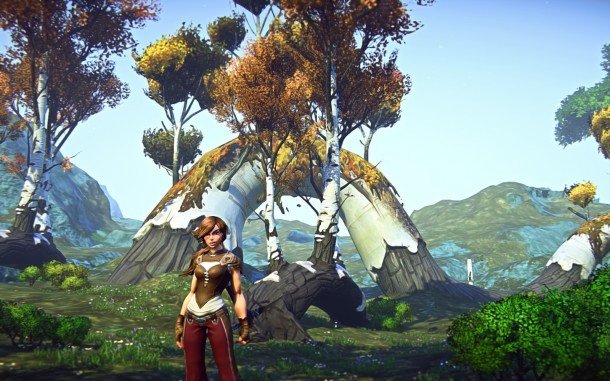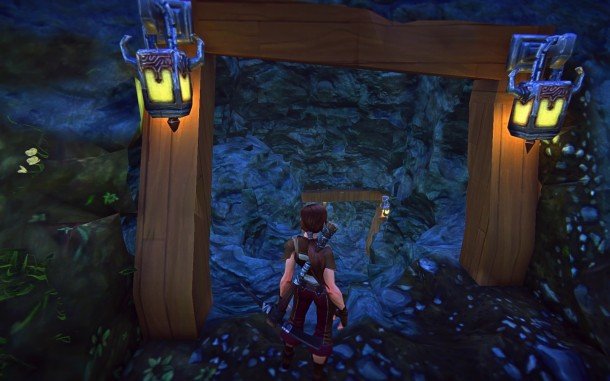EverQuest Next Landmark is "GURPS for MMOs," will include AI, combat, DM tools, more

There's EverQuest Next , and then there's EverQuest Next Landmark —two different MMOs linked by Sony Online Entertainment's unusual development process. Landmark will come first, sometime in early 2014, as a free-to-play MMO focused on exploring and Minecraft-style building, except with tools that go far beyond block stacking. Later on, however, Landmark will grow into the platform for EverQuest Next, and players will get all the tools SOE is using to build its flagship fantasy MMO.
AI and combat will be introduced to Landmark "as rapidly as possible" after launch, according to Creative Director Jeff Butler. And after that, it will become a much more complex player-generated world.
“We're GURPS for MMOs!” Director of Development David Georgeson tells PC Gamer, referring to the Generic Universal Roleplaying System which defines rules for tabletop roleplaying in any genre and setting. “I mean really, that's what Landmark is. You can build any world you can ever dream of, once we finish getting all the tools that we're using to build EverQuest Next...[the players] can build any world they've ever considered, and have other people be able to play through it. So if you want to have a weekly D&D group that gets together and plays adventures, do it! It's all going to be there, all that power is going to be there, it's just going to start out looking like building tools.”
We'll have dungeon master tools, we'll be scripting AI—basically, doing everything that might be done to build a fantasy MMO while simultaneously playing it. Regarding combat, however, Landmark currently employs a simpler ruleset than is being designed for EverQuest Next. EQ Next, for instance, will have over 40 classes, while only one has been announced for Landmark, where gear will be the primary determiner of a character's abilities. So not everything going into EQ Next will be in Landmark, but SOE doesn't plan to hold back much on features.
“We're not in the process of building Landmark and then moving on to build EverQuest Next,” says Butler. “We are building EverQuest Next with Landmark. We don't, and will not, have tools on the back end to create NPCs and to tune AI. That's Landmark. It is the tool that we're going to use to build EverQuest Next.
“We are populating the world. We're developing the dungeons. We're laying out the city of Qeynos and placing the NPCs and telling the stories through story bricks using the exact same tools that you guys are going to be looking at. We're not permitting there to be a point of separation between what we work on and what our players are going to have.”

Georgeson and Butler have also expanded on Landmark's in-game currency and real money economies, which will touch every aspect of play. Most notably, SOE's Player Studio will become a cash marketplace for player-gathered resources, plots of real estate on Landmark's servers, and player-designed building templates, which other players can buy and plop onto their land.
The biggest gaming news, reviews and hardware deals
Keep up to date with the most important stories and the best deals, as picked by the PC Gamer team.
"Player Studio is part and parcel with the game," says Georgeson. "People can make money off the templates and creations they make, but that doesn't help a harvester at all. So we've gone to the step of saying that they can collect resources and put bundles of resources up on Player Studio. They can also sell them for coin or just give them away if they want. So that allows them to have a submarket, a subculture that's running through and doing all these things, and they're getting to do the things they really love, and then the people who just want to build can just build if they want to."
Landmark will be free-to-play early next year. SOE has also just announced a Founders Pack which includes exclusive items as well as early access. That early access could turn out to be a big deal: if you grab a piece of land near a popular spawn point, it might end up being worth a lot of money on Player Studio when the severs fill up.

Tyler grew up in Silicon Valley during the '80s and '90s, playing games like Zork and Arkanoid on early PCs. He was later captivated by Myst, SimCity, Civilization, Command & Conquer, all the shooters they call "boomer shooters" now, and PS1 classic Bushido Blade (that's right: he had Bleem!). Tyler joined PC Gamer in 2011, and today he's focused on the site's news coverage. His hobbies include amateur boxing and adding to his 1,200-plus hours in Rocket League.

